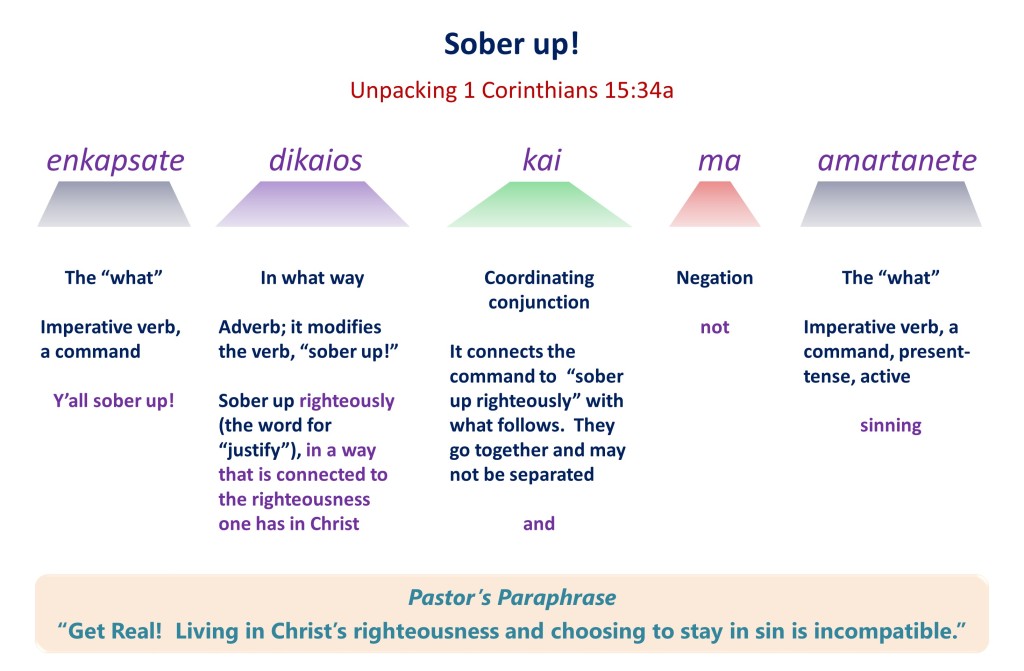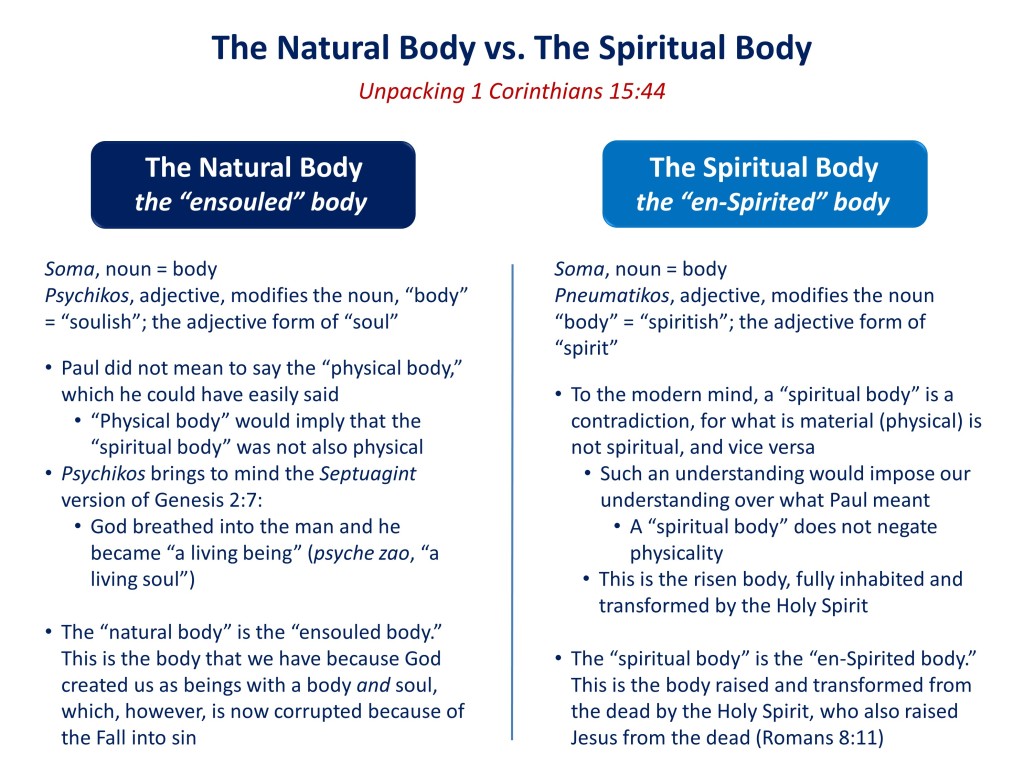 Paul has delivered what it means that God the Father has raised Jesus from the dead by the Holy Spirit (1 Corinthians 15:20, Romans 8:11). Because Christ was raised alive, those who are in Christ will also be made alive (1 Corinthians 15:22). But this will happen at His “coming,” when He returns on the Last Day (1 Corinthians 15:23). But Paul even lets us know what will happen after that!
Paul has delivered what it means that God the Father has raised Jesus from the dead by the Holy Spirit (1 Corinthians 15:20, Romans 8:11). Because Christ was raised alive, those who are in Christ will also be made alive (1 Corinthians 15:22). But this will happen at His “coming,” when He returns on the Last Day (1 Corinthians 15:23). But Paul even lets us know what will happen after that!
Read 1 Corinthians 15:24-26
- What happens when Jesus returns?
- When Jesus puts all His enemies under His feet, what does that mean about what will happen to this fallen creation?
- What will happen to death?
- That death is no more means what?
Read 1 Corinthians 15:27-28
- Who is the “he” who will not be put in subjection under “him”?
- What does it mean that God will be “all in all” in this post-Last Day reality? Will there be any place where God’s full and glorious presence will not made known?
- What about those in hell? Is God not there?
Excursus: “God is All in All”
Since creation has suffered the impact of sin, the end of sin and death results in a completely new creation (Romans 8:18-39). In this new creation, where everything is now eternal, God is “all in all.” That means His full and glorious presence is everywhere, nowhere hidden or diminished.
But this then may cause us to ask, “What about those in hell? Is God there?” Hell is experiencing eternity without Christ’s righteousness to make someone holy. Where the Christian experiences eternity as “child of Light,” the person in hell experiences eternity as being on fire, since his righteousness is not sufficient. (Think of the metaphorical descriptions of heaven and hell in Scripture.)
Hell is what happens when someone is in eternity, where God is simply being God without “hiding Himself” (as He does here, in Word and Sacrament, to make Himself accessible to us sinful creatures).
But what about 2 Thessalonians 1:9-10?
Some hold that hell is an eternal separation from God. Only one passage in Scripture exists that appears to teach this—and this is because of a poor translation. 2 Thessalonians 1:9-10 reads, “They [non-believers] will suffer the punishment of eternal destruction from [Greek, apo] the presence of the Lord and the glory of His might, when He comes on that Day to be glorified in His saints…”
“Away from” and “from” are both valid translations of the Greek word, apo. Apo is ambiguous and can carry a couple of meanings. Apo could mean that hell is an eternity from (that is, somewhere else, away from) God’s presence. However, apo could also mean that hell is “from” (as in “caused by” or “as result of”) God’s presence.
Hell is the result of God’s full presence in eternity. Here’s why?
- God is omnipresent, so no place exists where He is not, especially in eternity. When Paul says that God will be “all in all,” he means that there will be no place where God is not in His full glory.
- In 2 Thessalonians 1:9, Paul refers back to Isaiah 2:10, 19, and 21.
- Isaiah 2:10 reads: “hide in the dust from before the terror of the LORD, and from the splendor of his majesty.”
- “From before” is a translation of the Hebrew word min. Min means “from,” but also “by” and “because of.” Isaiah is saying to hide—not away from—but because of the Lord’s presence.
- Isaiah 2:19 and 21 describe the same scenario using the same Hebrew word, min.
Hell is experiencing eternity with only your righteousness to make you worthy, which is not enough.
————
The Absurdity of not believing in the Resurrection of the Dead
Read 1 Corinthians 15:29: “Otherwise, what will they do, those who are being baptized for the dead? If the dead are not raised at all, then why are they baptized for them?”
Excursus: Baptism on behalf of the dead
“on behalf of”: Greek, huper. In this verse, Paul uses the genitive form, which means “for, on behalf of, or for the sake of.” Another form of huper, the accusative, means, “above” or “over.” But we would be dishonest Greek readers to apply a meaning that Paul did not use (which is what Luther did here).
So, “Why were they (whoever they were) baptized for/on behalf of the dead?” Paul answers that in verse 29b: “If the dead are not raised at all, then why are they baptized for them [the dead]?” Such baptisms took place because of the resurrection of the dead! “They,” whoever they were, understood that baptism connected someone to Jesus’ resurrected life, bestowing to that person the eternal life flowing from, and in, Christ.
So, “they” understood what Paul taught in Romans 6:3-5.
Don’t you know that all of us who were baptized into Christ Jesus were baptized into his death? Therefore, through baptism, we were buried with him into his death, so that, just as Christ was raised from the dead by the Father’s glory, we too can walk in newness of life. For if we have been united with Him in the likeness of His death, we will certainly also be united in the likeness of his resurrection.
And that is what God does through baptism. Paul, then, used such baptisms for the dead to help testify to the reality of the resurrection of the dead. After all, if the resurrection of the dead were not true, then such baptisms for the dead would be meaningless!
The Linchpin
But we still don’t know who were being baptized for those who had died? We learn this in a verb that Paul used: poieo (Note: The Greek language can have the subject of the verb as part of the verb). Paul used a future-tense, 3rd-person plural form of “do”: They will do.
So, who were “they”? If Paul was referring to the congregation at Corinth, he would have used the plural “you.” If Paul was referring to himself and Sosthenes (the co-writer of 1 Corinthians), he would have used “we.” But Paul used, “they.” He was, then, referring to some other group, not the Christian congregation at Corinth. (The ESV obscures this by using the word “people.”)
What does this mean? Some other group, not the Corinthian congregation, had absorbed some aspects of Christian teaching. This group, “they,” were performing “proxy baptisms.” That’s baptizing someone for the benefit of another, in this case, someone who had died, someone who wasn’t baptized while still alive. (Most likely, this was a baptism for a family member who wanted no part of such a practice when he was alive). “They” were baptized for the dead because of the resurrection of the dead. (So, “they” properly understood what God did through baptism, but understood it incorrectly, “magically,” that baptism even worked for someone who had died, apart from faith.)
Although they were not part of the Christian congregation at Corinth, even “they” recognized the truth about the resurrection of the dead. So, if “they” recognized the truth of the resurrection to come, then how much more absurd was it be for a Christian to deny the truth of resurrection of the dead?!
———-
Read 1 Corinthians 15:30-32a
Who’s who in these verses? “We” = Paul and Sosthenes. You = Corinthian Christians. I = Paul.
- What is Paul saying about the resurrection of the dead in relation to him and Sosthenes putting themselves in danger for the Gospel?
Read 1 Corinthians 15:32b
- If the resurrection of the dead is not true, what then is the obvious conclusion in how someone should live his life?
Read 1 Corinthians 15:33
“be deceived”: Greek, planao, passive verb form: “be led astray.” The passive denotes that other teachings, outside the content of the Faith, were taking the place of what Paul had delivered to them (1 Corinthians 15:3). This wasn’t only what took place within someone (“being deceived,” where what one believed was changed), but also included how one lived his life (being led astray).
“bad company ruins good morals”: Paul quoted the Greek playwright, Menander (342-290 BC), from his play, “Thais.” The Corinthians Christians had allowed “bad company” to lead them astray. Doctrinal error about the resurrection can lead toward sinful life-choices, which can be both destructive and contagious (1 Corinthians 6:12-14; see also Proverbs 13:20).
Read 1 Corinthians 15:34
- In the context of what Paul says, what have some of the Corinthian Christians allowed those “who have no knowledge of God” to do?
The Resurrection of the Body
Paul now moves from defending the resurrection of the body to explaining it, in part. Paul will use examples from everyday life to help the Corinthians understand the resurrection to come. Through such, Paul will bring out both the continuity and transformation of the resurrection to come.
Paul uses a literary technique known as “diatribe,” where he creates an imaginary dialogue. He becomes the imaginary teacher, confronting an imaginary, foolish student, who represents the Corinthians.
Read 1 Corinthians 15:35
- By the questions that Paul had brought up, how was he setting up the absurdity of such questions that some had used to mock the resurrection?
Read 1 Corinthians 15:36-38
- Is a grain of wheat that germinates and grows still wheat? Relate this to the resurrection of the body (continuity).
- Like a grain of wheat that germinates and matures into a plant, relate this to the resurrection of the body (transformation).
Read 1 Corinthians 15:39-41
- How is our understanding of flesh and body (Paul even used “body” metaphorically to describe heavenly bodies) incomplete to understand what awaits us?
“glory”: The Greek has a word for “brightness,” lamprotes, where we get our word “lamp.” Acts 26:13 uses lamprotes to describe the sun’s brightness. But here, Paul uses doxa, “glory.” The “glory” of our resurrected bodies is that they will still be our bodies (continuity: as seed and plant are both wheat), but also transformed (glorified: a wheat plant is not the seed). Just as, from an earthly perspective, heavenly bodies differ from earthly bodies, so will our resurrected bodies differ from what we now have.
Daniel 12:2-3:
The many of those who sleep in the dust of the earth will awake—some to eternal life, others to shame and eternal disgrace. But the wise will shine like the brightness of the heavens, and those who lead many to righteousness, like the stars forever and ever.
Read 1 Corinthians 15:42-44a
- Paul contrasts the difference between the bodies we now have with our resurrected bodies. How will our resurrected bodies differ? Discuss each example that Paul uses.
Next week, we will continue with Paul still contrasting the “ensouled body” with the “en-Spirited body” and what the resurrection of the body means for the Christian.
Click here to go to the next Lesson.



